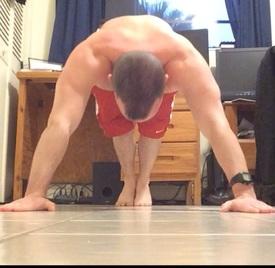MFP vs. Gym Equpiment. HELP!?!?!

TLC7613
Posts: 86 Member
Ok, so this has always been a question I've never been able to understand. When your using the elliptical or treadmill and you log in your time and calories burned, the difference between what MFP assumes it should be and what the machine says it is, is ALWAYS like a 200 cal. difference and I never really know which one to burn. I always take the lesser of the two because I would rather assume I've worked out less then think it's more and wonder why im not losing etc.
I know that MFP can take into consideration your body measurements when the gym machine does not ask for your heights and weight etc, but MFP doesn't know if you went fast or slow, or if you had more resistance etc. What do ya'll think???
I know that MFP can take into consideration your body measurements when the gym machine does not ask for your heights and weight etc, but MFP doesn't know if you went fast or slow, or if you had more resistance etc. What do ya'll think???
0
Replies
-
If I use a machine, I always enter my data, weight and age because I know it tracks calories better. The machine also takes into consideration resistance and speed. MFP always had my calories high, so I would always use what the machine said instead. However I've just upped my resistance level on the elliptical and find I'm now pretty even with MFP, but I still use what the machine logs for me.0
-
I use a HRM, and the ONLY thing I ever see MFP get close on is the bicycling. Treadmill comes up short for me, and the elliptical comes up high.0
-
I've always wondered this myself and am interested in the answers.0
-
I use a HRM for my cardio, which is more accurate than MFP or any gym machine can estimate (for cardio - HRM's are not accurate for weight training).
That said, gym machines are notorious for over-estimating calorie burn. So I would take the one with the lower burn (which will usually be MFP).
I also normally only eat back half my exercise calories, to account for errors (both for over-estimating on the exercise side and under-estimating on the food side).0 -
This is an easy and simple answer:
Invest in a Heart Rate Monitor.
The HRM will calculate your metabolics based on specific data that YOU provide.
Absolutely zero guesswork regarding exercise.0 -
I use a heart rate monitor to be sure. When I work out on the elliptical, MFP says I burn HUNDREDS of calories more than what I actually do. But when I walk, MFP is right on target. Don't rely on MFP to calculate it for you. There are too many variables. Invest in a heart rate monitor if you can.0
-
It's like the personal trainers say. Take what the machine says, then subtract it by 75. When I got my Heart Rate Monitor I was shocked with how far off the calorie burn was compared to the machines to my HRM. Even when I would enter the information on the machine, it was still off my almost 100 calories.
If you want an accurate reading, then I suggest getting a HRM. However, it's not a necessity. I was successful with my weight loss without a HRM. I only use one now because I received it as a gift almost a year ago.0 -
I use a HRM0
-
I enter 10bls less on the machines when they ask for weight at the beginning. I find that this matches up fairly closely to my Bodymedia.0
-
I use a HRM, and the ONLY thing I ever see MFP get close on is the bicycling. Treadmill comes up short for me, and the elliptical comes up high.
^^^ This for me.0 -
Nothing is perfect, especially a form calculator like MFP. Use the machine's estimate and you will be fine.0
-
I use a HRM for my cardio, which is more accurate than MFP or any gym machine can estimate (for cardio - HRM's are not accurate for weight training).
That said, gym machines are notorious for over-estimating calorie burn. So I would take the one with the lower burn (which will usually be MFP).
I also normally only eat back half my exercise calories, to account for errors (both for over-estimating on the exercise side and under-estimating on the food side).
^ This is a pretty solid answer, but I'd add if you dont have a HRM, definitely cut MFPs number 20 - 25% (in general). If you use a machines #, Id cut it in half (the people who make these machines want you to like them! SO, big burns = happy exercisers = lots of positive talk abt their machines)...
Bottom line is always use smaller burns, this way if you do make mistakes, you make them in the right direction! (Same goes for food btw, but opposite - always assume MORE food when unsure, again to make your mistakes in the right direction!!)
Finally, the best advice above is the part about only eating half of exercise cals back - I mean the worst thing that could happen is ooops, i lost more than i thought I would!!
GOOD LUCK!!0 -
I enter 10bls less on the machines when they ask for weight at the beginning. I find that this matches up fairly closely to my Bodymedia.
I always enter in less weight too (10-20 pounds) and I still subtract some. I subtract the most from the elliptical because studies have shown the elliptical to be the most inaccurate.0 -
As a general rule MFP is pretty far over on calorie burn estimates. It has been my experience that gym equipment is also. For the most accurate results use a HRM that is calibrated with your specs. Monitors are expensive, but if you can afford one, it is the only way to get accurate numbers for this stuff. You can also look up your Metabolic Equivalent Task numbers and with a little quick number crunching get an idea of what your common exercise tasks burn per hour.0
-
If you don't want to buy an HRM, there are calculators online where you can input your average heart rate, time, weight, etc. that will give you a decent estimate (just look up heart rat calorie calculator. They assume a VO2max of a person of average fitness or you can input it manually if you know it. I've found that if I do an hour of cardio and take my heart rate about 15 minutes in, that will give me a fairly accurate average heart rate (from times when my HRM wasn't working).
When I used to go by machine numbers, I would always take off 20%. After getting an HRM I found that was generally pretty accurate too.
Treadmills are often all over the place since they can't tell if you're running or walking. I've noticed that they're generally pretty accurate for running, but overestimate calories for a slow walk and seriously underestimate calories for a very fast walk. That's partly true of all machines. For instance, an elliptical doesn't know if you're hanging on to stationary handles or using the moving ones.0
This discussion has been closed.
Categories
- All Categories
- 1.4M Health, Wellness and Goals
- 398.5K Introduce Yourself
- 44.7K Getting Started
- 261K Health and Weight Loss
- 176.4K Food and Nutrition
- 47.7K Recipes
- 233K Fitness and Exercise
- 462 Sleep, Mindfulness and Overall Wellness
- 6.5K Goal: Maintaining Weight
- 8.7K Goal: Gaining Weight and Body Building
- 153.5K Motivation and Support
- 8.4K Challenges
- 1.4K Debate Club
- 96.5K Chit-Chat
- 2.6K Fun and Games
- 4.8K MyFitnessPal Information
- 18 News and Announcements
- 21 MyFitnessPal Academy
- 1.5K Feature Suggestions and Ideas
- 3.2K MyFitnessPal Tech Support Questions














